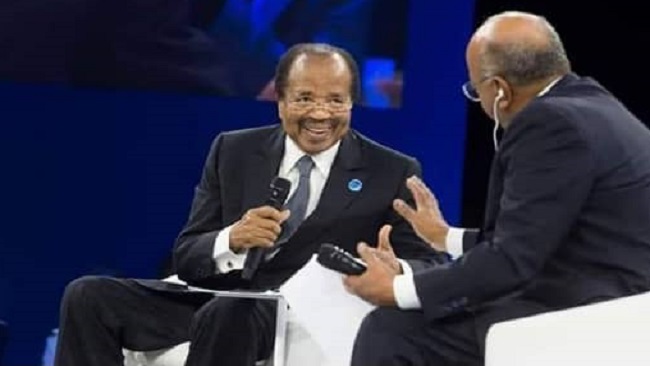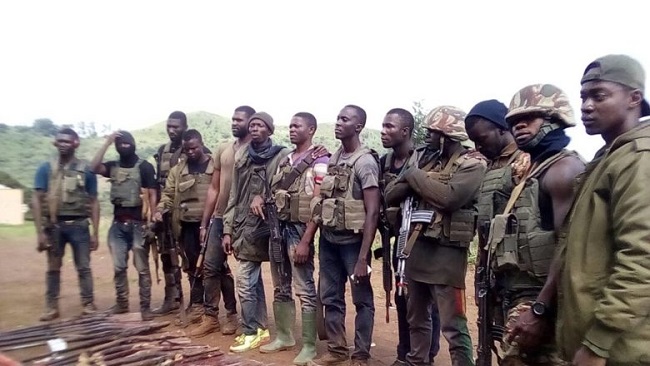14, November 2019
Biya has recipe for ethnic cleansing of Southern Cameroonians 0
For 37 years, the French Cameroun head of state Paul Biya has demonstrated that his CPDM regime has a long-term plan for the ethnic cleansing of the people of Southern Cameroonians.
A Southern Cameroonian commenting on Mr Biya’s recent outing in France opined that during the Conference, Biya said German Kamerun was his country that was divided into the British and French trusteeships.
The 86 year old dictator furthered that he has tried to assimilate and dissolve the English 20% into the French 80% but failed and wants to give a special status to the English 20%, but keep them within one country.
It is based on this claim to German Kamerun being Biya’s country, that Southern Cameroonians think, the French Cameroun leader believes he has a duty to kill Ambazonians to force them to belong to his vision of a one and indivisible Cameroun.
Southern Cameroons political analyst Denis Atemnkeng observed that Biya’s take on the crisis in Ambazonia is the most outrageous and dangerous statement from a man sitting in a peace conference.
A cream of Ambazonia political elites in the United Kingdom observed on Wednesday in London that the French Cameroun regime backed by France is moving toward a greater plan which is a kind of scorch-the-earth policy.
Troops loyal to the Biya regime in Yaoundé have burnt down more than 280 Southern Cameroons villages with Biya claiming that the soldiers were fighting Ambazonia separatists operating in those areas.
An estimated 20,000 Southern Cameroonians have been killed, over 120,000 are seeking refuge in Nigeria and, over 1million people are internally displaced or living in bushes and over 3,000 persons incarcerated in prisons and detention facilities. It is also reported that over 4.5. Million people are at risk of famine. This is indeed a recipe for endless war and the ethnic cleansing of Southern Cameroons.
Biya’s special status plan for Ambazonians is pushing the two Cameroons towards endless crisis; and if true, the least the international community can do is to respond to this by saying no and support the Ambazonia nation.
By Soter Tarh Agbaw-Ebai




























15, November 2019
Federal Republic of Ambazonia: Southern Cameroons elites still have great deal of work to do in the resistance 0
A majority of Southern Cameroonians living abroad including those in Ground Zero are of the opinion that the Ambazonia Interim Government (IG) post the disgraced Dr Ikome Sako and Chris Anu era still has a lot of work to do in the territory now occupied by French Cameroun troops and Biya-backed armed militia. They are right.
From London to Atlanta, from Berlin to Oslo and from Pretoria to Paris, the story is the same! Ambazonians are disappointed with the management of the funds that was raised for My Trip To Buea and French Cameroun is reportedly gaining from the fabricated divisions in the Interim Government and the failure of other sub groups to join the majority following of the IG.
With the dust now settled, Southern Cameroonians can see clearly and of course the Southern Cameroons elites have themselves to blame for shying away from leadership and allowing cash strapped men and women to take over control of leadership.
Vice President Dabney Yerima and his war cabinet still have a lot of work to do if the Federal Republic of Ambazonia is to become a reality, as there is a large number of Southern Cameroons successful elites in the West, who are willing to donate money for the struggle but need to start seeing some properly coordinated actions in Ground Zero.
We of the Cameroon Concord News Group are hoping that the Vice President’s announced tour for the struggle would be successful. We understand that many objectives have been reached and the French Cameroun leader Paul Biya and his ruling CPDM crime syndicate are crumbling at catastrophic rapidity. But not every objective!
We expect right thinking Southern Cameroonians to ignore the negative distractions coming from the disgraced Sako Ikome and Chris Anu and help Vice President Dabney Yerima and his team to manage to mitigate the situation in Ground Zero, establish good ties between the Ambazonia Interim Government and other sub groups, and reach decisive general solutions which would appease donors in Europe, the US and South Africa for Southern Cameroonians to completely regain their territorial integrity.
Our chief intelligence officers in Ground Zero are reporting that things are moving back to normal and French Cameroun agents are planning to stage elections next year in the territory. This is happening because it has been extremely difficult for Southern Cameroonians to switch off tribal loyalty and pursue the bigger picture.
Day-by-day, Sako Ikome and his acolyte Chris Anu are sending conflicting signals to the international community and Southern Cameroonians in Ground Zero all in a bid to give the impression that it is either them at the head or no one else. This is now their trade mark.
However, many successful Ambazonian elites in the diaspora are aware that Sako and Chris Anu can no longer be one entity with the Southern Cameroons quest and struggle for independence and are running away from them.
French Cameroun head of state, Paul Biya has now made it crystal clear that there was a policy put in place to assimilate the people of Southern Cameroons which have failed. Not donating to the Ambazonian struggle, not investing in the Amba Bonds Project is tantamount to accepting the so-called Special Status that will continue to keep Southern Cameroonians as slaves and second class citizens of the One and Indivisible Cameroon.
The world needs to see Ambazonians waging a war of liberation void of any distraction from failed and corrupt leaders.
By Soter Tarh Agbaw-Ebai